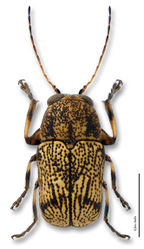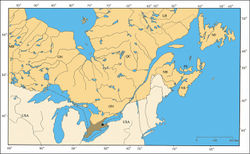Difference between revisions of "Pachybrachis calcaratus"
m (Imported from ZooKeys) |
m (1 revision) |
(No difference)
| |
Latest revision as of 14:39, 19 September 2013
| Notice: | This page is derived from the original publication listed below, whose author(s) should always be credited. Further contributors may edit and improve the content of this page and, consequently, need to be credited as well (see page history). Any assessment of factual correctness requires a careful review of the original article as well as of subsequent contributions.
If you are uncertain whether your planned contribution is correct or not, we suggest that you use the associated discussion page instead of editing the page directly. This page should be cited as follows (rationale):
Citation formats to copy and paste
BibTeX: @article{Barney2013ZooKeys332, RIS/ Endnote: TY - JOUR Wikipedia/ Citizendium: <ref name="Barney2013ZooKeys332">{{Citation See also the citation download page at the journal. |
Ordo: Coleoptera
Familia: Chrysomelidae
Genus: Pachybrachis
Name
Pachybrachis calcaratus Fall, 1915 – Wikispecies link – Pensoft Profile
- Pachybrachys calcaratus Fall, 1915: 389
Recognition
Color dull yellow, with diffuse brown markings on pronotum, with more contrasting markings on elytra (Habitus 3); ocular lines absent; front tibiae of male with subapical rectangular tooth on inner margin, due to abrupt narrowing of tibia, and with long stout curved terminal spur (Figure 5c); terminal spur of front tibia of female reduced to narrow spine; male size small: length 2.09 ± 0.07 mm, width 1.106 ± 0.04 mm.
Distribution
Pachybrachis calcaratus has been found across the central portion of the United States but only in small numbers (Barney, unpublished data). Within the area of this study, it is restricted to the Carolinian Life Zone in southern Ontario (Map 3).
Material examined
ONTARIO: Essex Co., Roseland, 24.VI.1942, ‘compared with type’, J. A. Wilcox [1♂, CDFA]; same data, except 24.VI.1944, S. D. Hicks [1♂, CNC].
Host plants
No information was recorded on the specimens collected in southern Ontario. Clark et al. (2004)[1] reported Pachybrachis calcaratus nibbling purple loosestrife, Lythrum salicaria L. (Lythraceae), in Ohio.
Comments
Pachybrachis calcaratus is another of Fall’s (1915)[2] Group C species that have “great variation in the degree of (elytral) maculation.” The tibial spur (Figure 5c) is a defining character. Pachybrachis calcaratus was very likely associated with the Carolinian Life Zone in southern Ontario in the past. However, it has not been seen from there for the last 68 years.
Taxon Treatment
- Barney, R; LeSage, L; Savard, K; 2013: Pachybrachis (Coleoptera, Chrysomelidae, Cryptocephalinae) of Eastern Canada ZooKeys, 332: 95-175. doi
Other References
- ↑ Clark S, LeDoux D, Seeno T, Riley E, Gilbert A, Sullivan J (2004) Host plants of leaf beetle species occurring in the United States and Canada. The Coleopterists Society, Special Publication No. 2, 476 pp.
- ↑ Fall H (1915) A revision of the North American species of Pachybrachys. Transactions of the American Entomological Society 41: 291-486.
Images
|


